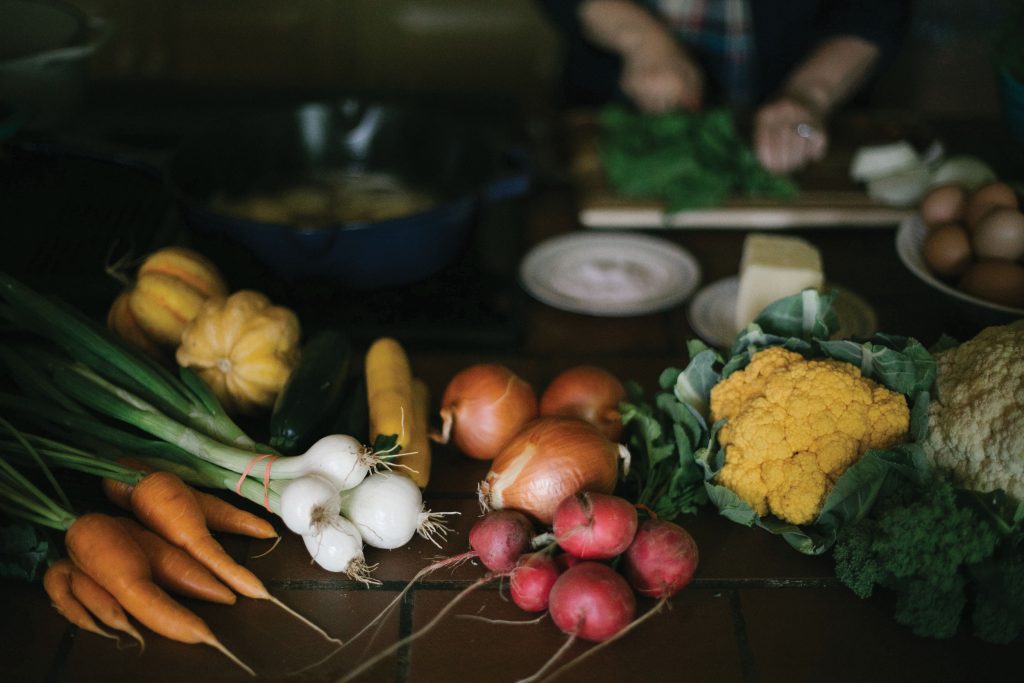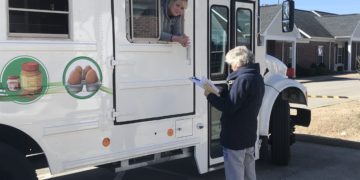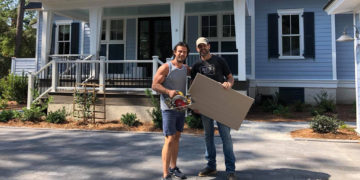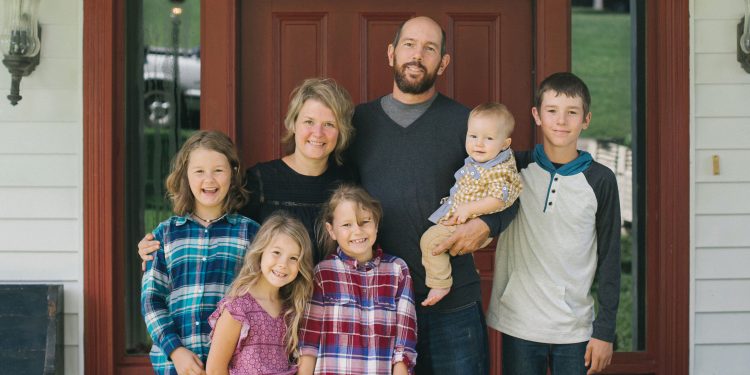Nathan Howell comes in from the big field. His son, 13-year-old Carter, helps unload boxes of fresh-picked vegetables from the truck and carries them into the family’s general store.
When the job is done, Carter turns to his father.
“We’re goin’ back out in the field to get the kohlrabi,” he says, a boy with the poise and confidence of a man. “We got a ton of lettuce, too.”
“Go ahead and bring it in, then,” Nathan says, and Carter heads out the door just as his sister, Adeline, 7, struts in. Her head full of curls bounces just as she does. She hands her dad a sunflower seed culled from the family’s sunflower patch and asks him to try it.
A few feet away, her mother, Michelle, is emptying the boxes her husband and son just delivered. Okra, yellow squash, peppers and potatoes go into bushel baskets to await the arrival of today’s shoppers.
“I think they need to be roasted or dehydrated first,” she says of the sunflower seeds. Adeline giggles.
It’s a Thursday — harvest day for Need More Acres Farm. The name hints to the farm’s meager beginnings — a two-acre plot in the Bowling Green city limits where the couple first began growing vegetables as a side gig. Together with two other families, they helped found the Community Farmers Market at 2319 Nashville Road, where they still sell produce weekly. The family found they soon outgrew their town garden as demand rose for their locally grown produce.
“We realized early on that we needed more acres,” Michelle laughs.
It took a few years to find the perfect plot — the 1829 hillside homestead of a Revolutionary War soldier. The home came with a little over 20 picturesque acres. The couple purchased the farm and transitioned to full-time farming in 2013. Today, Michelle and Nathan Howell grow more than 100 different fruits and vegetables, including more than 30 varieties of heirloom tomatoes. The local produce is sold at the market and served weekly to members of the farm’s Community Supported Agriculture program.
To have consistent income during the winter months — which can be especially challenging for farmers — the couple turned to year-round rotations of crops. The “big field” is where summer crops like tomatoes, squash and cucumbers are planted. Directly behind the house, perfectly aligned rows of several varieties of kale and other fall crops grow. The general store sits next to the house, and behind the store are tunnels for growing winter greens and root crops like carrots, turnips, sweet potatoes and beets.
“Most people don’t realize how well-suited Kentucky is for year-round growing,” Michelle said.
Growing through all four seasons keeps the general store stocked — which is where those who are members of the farm’s CSA program come to shop weekly. For $7,000 a year — which averages out to just over $134 a week — CSA members can take home all the locally grown fruits, vegetables, milk, eggs, pork and beef they need each week. On Thursdays after the harvesting is done, the Howells and their children arrange the freshly picked fruits and vegetables in the bushel bins of the general store they built beside their home, ready for the weekly shopping adventures of CSA members. The small scale farm can accommodate just a few more families in the program.
Michelle empties a box of okra into a bushel basket. The door flies open again, and 8-year-old Lilah scurries in, avoiding eye contact with the stranger in the store. She darts behind her mother, then slowly peaks out from the side, a wide grin across her face.
It’s moments like these — when Carter is learning the virtue of hard work and Adeline is learning how to eat what the earth provides — that reaffirm the Howells’ decision to leave their full-time state jobs to become full-time farmers and entrepreneurs.
Nathan grew up on a family farm in Hart County, working long days in the cornfields alongside his dad. He left the farm to attend college and pursue a career that provided more predictability. He met Michelle at Western Kentucky University, and after graduating with degrees in agriculture, they landed jobs with Kentucky Cooperative Extension helping farmers across Kentucky transition out of tobacco production. They taught farmers how to plant and harvest fruits and vegetables in their fields and introduced them to new vegetables, like bok choy, and how to build hot houses and tunnels for year-round growing.
Nathan worked for the state for 14 years, but he felt a shift happening inside him as his oldest son, Carter, began to grow. Nathan realized he wanted his son working beside him, learning the values of hard work and family. Just like Nathan had learned from working next to his own father.
“I grew up working beside my mom, dad and sister,” Nathan said. “Then I went to college and thought I was going to leave the farm production side and get into the business and education part of it. But I always felt a call to produce.”

In addition to the produce, the Howells used grants and a crowd-sourcing loan to build a certified commercial kitchen on-site where they flash-freeze foods for the winter or make soups and broths. Their children use the kitchen to assemble “Lilah’s Lunch Boxes” — the brainchild of their daughter. She makes a homemade ranch dressing in the kitchen to go with her boxed salads, which she sells weekly at the farmers market. The certified commercial kitchen is available for other farmers to rent, too, so they can freeze, can, bake and process their own locally grown foods.
It’s just one of the many ways the Howells are having an impact not just on the way their family eats — but on the way others connect to their food. The Howells sell fresh produce to local restaurants and partner with several local school systems to provide locally grown watermelon for school lunches. They participate in a vegetable tasting program in Allen County schools. The couple talks to its CSA families about how to cook the vegetables they grow — some of which are unique fare for this area. They share tips and recipes. The Howells also have a partnership with HOTEL INC., which takes fresh produce from the farm and packages it with all the needed ingredients for a full meal for those in need.
“I really care about food access and connecting people to local foods,” Michelle said. “My mom was disabled, and there were times in my life when I had limited access to food. I think that’s part of what drives me to partner with public health and community organizations.”
The Howells also use Need More Acres to advocate for the growth of farming as a career choice in Kentucky. Michelle said many second and third generation farmers left the profession in the 1990s and 2000s, and the average age of today’s Kentucky farmers is around 57 years old.
“It’s hard work — and we need young, strong bodies who can come in and do this work,” Michelle added.
The Howells have hosted apprentice farmers at their homestead and are more than willing to share their story and offer advice to other farmers. They also work diligently to educate the public on the virtues of small-scale farming and eating locally-sourced foods.
“We’ve been able to take our experience with our extension positions and expand it to our farm,” Nathan said. “We’ve continued to work with the networks we created.”
The couple estimate that more than 3,000 people of all ages have visited their farm.
“We want people to grow up at least understanding how farming works,” Nathan said. “We don’t want to be agritourism — but we do want to be open to the public to let them know what it’s like on a working farm.”
For more information, visit needmoreacres.com. To learn more about the CSA program, visit Nathan Howell at the Community Farmers Market on Nashville Road.
And what it’s like — is hard. The family is up and in the fields around 7 a.m. each morning, earlier if it’s hot outside. As one crop is being harvested, another is waiting to go in the ground. Machinery can’t do the job of picking. No, Michelle, Nathan, their children and a few hired hands must go up and down each row cutting and tugging. There are weeds to hoe, plants to water, holes to be dug. When an animal is sick, they are up long nights to nurse it back to health.
“We all helped our grandmother pick the veggies out of her garden,” Michelle said, “but we didn’t see the 40 hours she probably spent that week out there taking care of it.”
Still, Nathan and Michelle need do little more than look into the bright and shining eyes of their five children to see the rewards their labor has reaped.
They work hard, but they smile — big. They will grow up knowing what resiliency and grit look like. They’ll grow up knowing they have parents and siblings they can count on. And that they are counted on, too. They’ll know what it is like to feel cool earth beneath their bare feet as they walk the rows, and the softness of feathers on their hands. They’ll have tasted the ripened goodness of a hundred-year-old variety of tomato as its juice runs down their arms.
And just like their dad, they’ll grow up working right next to their biggest heroes.


















